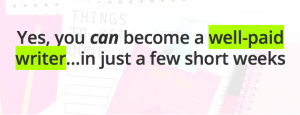The Ten Income Streams That Contribute To My ‘Freelance Writing’ Business

The key to success in the gig economy is still under dispute. Some people think it’s specialisation, which is basically the art of doing one thing exceptionally well. If you’re the best in the world at something, you’ll always get paid for doing that thing. The flaw in that thinking is obvious. Only one of us can be the best in the world at any given thing, and I don’t know about you, but I’ve never been a ‘best in world’ kind of person.
I am, however a working freelance writer, and I’ve learned to diversify. My income streams are varied, my eggs are in different baskets, my freelance career, is, if not bullet-proof, less risky than many. That’s because I subscribe to the idea of multiple income streams. Here’s what they are.

Disclosure: Sometimes my work here (and all around the web) contains affiliate links. Find out what that means here.
Freelance writing
I consider myself to be truly freelance writing when I pitch to a publication, website or magazine and have my work accepted and paid for. My freelance work has appeared in places like The Washington Post, The New Zealand Herald, and Life Info Magazine. Writing, pitching and submitting articles for publication is generally considered to be the most important activity in a freelance writing business, and some weeks, I don’t do it at all.
Content creation
This is similar to the above but is ‘done to order’. If someone wants content for their website, blog, or (occasionally) for other online spaces (such as social media streams, newsletters or sales pages), I’ll create it. This is done mainly through content creation agencies, with the odd private client.
Content creation gigs can be one-offs or recurring, or sometimes on a retainer basis (when I’m retained to work for a certain amount to hours each week, or produce a certain amount of posts each month). Content creation work can be the easiest type of work to get, as once you’ve proved yourself to an agency or two, they will keep sending the work to you, without you having to chase it too hard.
Content marketing
In practice, content marketing often involves the same skills as content creation, but is more likely to involve me in strategy, long term planning, and generally tying together a promotional campaign. It’s more lucrative than ‘just’ writing, but tends to require me to stretch my skill set, maybe having to create simple Facebook ads, come up with an ad budget, design a sales funnel or produce an email marketing campaign. This is generally paid by the hour, usually for an ongoing contract.
Editing and proofreading
I’m a trained copy editor and proofreader, and actually enjoy this work, though it’s not as well-paid as producing original content. I mainly edit and proof non-fiction, but have also been involved in copy editing novellas and short stories. I rarely chase this kind of work, but I still advertise it as a service on my hire me page, and clients I’ve worked with before will sometimes approach me to edit something new for them.
Affiliate marketing
This may not sound like it’s related to writing, but every product I promote as an affiliate is one that I write about at some level. I always tell new affiliate marketers that the best way to sell an affiliate product is with a well-written blog post that highlights the need for that product, the problem it solves, or a big advantage of the product. I write about being a solopreneur over at my blog, and most posts highlight or recommend products that I’m an affiliate for.
Revenue share sites
Revenue share sites used to have a bad name, and most still do, but they come in many different forms, and top writers can make big money from them. Medium, for example, certainly doesn’t market itself as a revenue share site, but writers in the Medium partnership program accrue earnings that are basically a share of the revenue that Medium generates each month from online subscriptions. As I get a payment from the Medium partnership program most months, I guess I’m technically sharing their revenue.
In the past I wrote on the now defunct Squidoo, which was taken over by Hubpages (wrote there too) and I actually got my first ever upfront payment as a writer from a client who found me through the now long dead Helium.com, also a revenue share site. Most people will never earn a decent amount of money from revenue share sites, but there are exceptions.
Coaching for writers
After I wrote my book How To Start Your Freelance Writing Career From Scratch, I started getting emails asking me for advice. I loved having an extra opportunity to help new writers, but soon realised that I couldn’t possibly take big chunks of time away from writing to critique and advise others while still feeding my family. This led to the birth of my mini-coaching packages. If you want writing advice tailored to your specific writing and situation, I’ll give it to you, by email, at a very affordable price. I’m not even sure ‘coaching’ is the right term for what I do with these mini-packages, but it seems to work for my clients, and offers another income stream for me.
Ebooks
My ebooks are available on Kindle and bring in a small amount of extra revenue each month. Like most indie authors, I don’t make a living from my books, even though I sell a decent amount of them, but they promote my other work, build my audience, and allow me to place yet another small egg in yet another basket. Plus that basket is Amazon, who seem, at this point in time, a fairly risk-averse choice when it comes to partnering up with another business or entity.
Other digital products
I’ve created a set of digital products to help other writers, bloggers and affiliate marketers. I call them my Success Kits, and they are basically digital kits containing all the templates, checklists, cheat sheets and other tools I use to run various aspects of my business. I wrote and/or edited the content for these kits, and one of them is even called the Freelance Writer’s Success Kit, but as an income stream, they feel far removed from the day-to-day freelance writing work I produce.
My online shops
Shop keeping and writing don’t seem to have an awful lot in common, but my freelance writing and blogging activities have somehow led to me managing a few virtual shops or stores. I have an Etsy shop, selling my printable journals, planners and wall art, an Amazon Influencer store, where I curate products that generally have at least a vague link to my freelance writing business (such as books for writers, home office equipment and tech I use in my business), and my Cafepress stores. The link between my Cafepress stores and my writing is tenuous, but as I sell mugs, throw pillows and even pajamas aimed at writers, you don’t need to work too hard to see how one thing led to another.
Are ten income streams too much? Maybe. I’m spread pretty thin some days, and unsurprisingly (to anyone familiar with the 80/20 rule) most of my income comes from only two of these ten activities (but a little bit of income comes from every single one, and I’m an ‘every little counts’ kind of person). Diversifying your income can help make your days more interesting, your income a little more consistent, and your working life a little less risky.
*****
Want more training on freelance writing? Check out the Write Your Way To Your First 1K course to help you make your first $1000 from your writing.
This piece was originally published in TheWritingCooperative.com.






Be the first to comment.